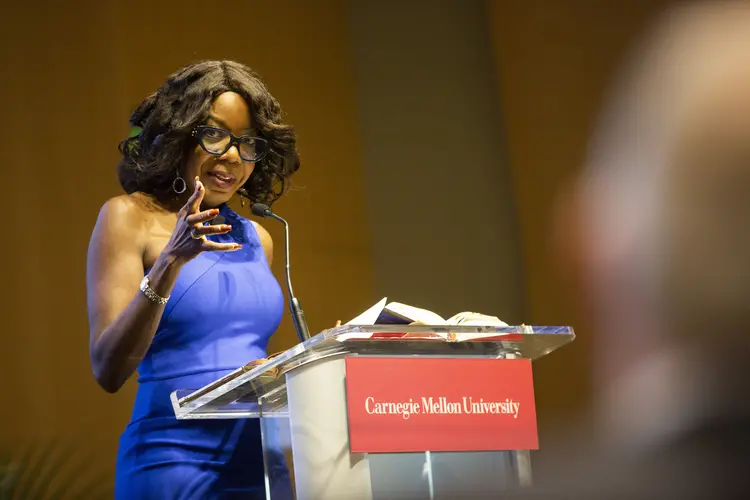Edda Fields-Black Named Director of the Humanities Center at Carnegie Mellon University
Media Inquiries
Edda Fields-Black, a professor of history, has been appointed director of the Humanities Center(opens in new window) at Carnegie Mellon University, effective July 1.
She succeeds David Shumway(opens in new window), a professor of English, who has led the center since its inception in 2003.
“David Shumway helped raise the money and provide the vision for establishing a humanities center at Carnegie Mellon over 20 years ago, and he led the center as its director for more than two decades. This was a long labor of love, and I am grateful to David for his thoughtful leadership,” said Richard Scheines(opens in new window), Bess Family Dean of the Dietrich College of Humanities and Social Sciences. “I am also delighted to be appointing Professor Fields-Black to succeed David as the next director of the center. Edda will bring big energy, big ideas and enormous creative talent to the job. I have been a fan of her work for my entire tenure as dean, and I am excited to see where she will take the center.”
The Humanities Center aims to strengthen research and teaching in the humanities; nurture interdisciplinary collaboration among the humanities faculty, and between humanities faculty and faculty in other disciplines; and foster a greater role for the humanities, nationally and internationally, in an increasingly technological and global society.
“I envision the Humanities Center as an incubator that: supports humanities faculty in doing cutting-edge and interdisciplinary research; highlights our faculty in educating the campus community (the way only humanists can) about pressing issues of our day; inspires our faculty by putting us in conversation with the best and brightest humanists in our fields; and propels us all to the next phase of our careers and out onto the public stage,” Fields-Black said. “In partnership with the Center for the Arts in Society(opens in new window) and the Humanities Scholars Program(opens in new window), the Humanities Center will foster a flourishing ecosystem for humanities faculty and humanistic research at Carnegie Mellon.”
Fields-Black has been a faculty member in Dietrich College’s Department of History(opens in new window) since 2001. She is a specialist in the transnational history of West African rice farmers, peasant farmers in precolonial Upper Guinea Coast and enslaved laborers on rice plantations in the South Carolina and Georgia Lowcountry during the antebellum period.
This year, Fields-Black published “COMBEE: Harriet Tubman, the Combahee River Raid, and Black Freedom during the Civil War(opens in new window),” which offers the fullest account to date of Tubman’s Civil War service, one of the most dramatic episodes of the Civil War and the largest slave rebellion in U.S. history: the U.S. Army’s June 1863 raid on seven rice plantations along the Combahee River in the South Carolina Lowcountry. The Wall Street Journal(opens in new window) and The New Yorker(opens in new window), among other national publications, have reviewed “COMBEE.” In February, Fields-Black published an op-ed in the New York Times(opens in new window) about how, on a smaller scale, the interdisciplinary research methods she developed and new sources she employed in “COMBEE” can be used by millions of African Americans to identify their enslaved ancestors.
Throughout her career, Fields-Black has used interdisciplinary sources and methods to uncover the voices of historical actors in precolonial West Africa and the African Diaspora who did not author written sources. She has also collaborated with scientists, artists and museum curators to bring these untold stories to life. Fields-Black is the executive producer and librettist of “Unburied, Unmourned, Unmarked: Requiem for Rice(opens in new window),” a contemporary classical symphonic work about rice and slavery and a collaboration with three-time Emmy Award-winning composer John Wineglass. She pioneered “taking history off the shelf and putting it on stage” by writing a libretto based on primary sources, which bears witness to the humanity, labor, skill and suffering of Black people engaged in rice production in the antebellum South Carolina and Georgia Lowcountry. The first three movements of “Unburied, Unmourned, Unmarked: Requiem for Rice” debuted at Pittsburgh’s Carnegie Music Hall in February 2019 and were most recently performed at Lincoln Center in March 2023.
Fields-Black was the consultant for “Power of Place(opens in new window),” a permanent exhibition at the Smithsonian National Museum of African American History and Culture, an adviser for “From Slavery to Freedom(opens in new window),” a permanent exhibition at the Senator John Heinz History Center, and a consultant for the International African American Museum in Charleston, South Carolina, for the “African Roots,” “Carolina Gold” and “Gullah Geechee” permanent galleries.



